The Best Prog Rock Drummers Of All Time Ranked
The genre coincided with the mid-1960s economic boom that allowed record labels to allocate more creative control to their artists, as well as the new journalistic division between “pop” and “rock” that lent generic significance to both terms. It saw a high level of popularity in the early-to-mid-1970s, but faded soon after. Conventional wisdom holds that the rise of punk rock caused this, but several more factors contributed to the decline. Music critics, who often labelled the concepts as “pretentious” and the sounds as “pompous” and “overblown”, tended to be hostile towards the genre or to completely ignore it. After the late 1970s, progressive rock fragmented in numerous forms. Some bands achieved commercial success well into the 1980s (albeit with changed lineups and more compact song structures) or crossed into symphonic pop, arena rock, or new wave. Early groups who exhibited progressive features are retroactively described as “proto-prog”. The Canterbury scene, originating in the late 1960s, denotes a subset of progressive rock bands who emphasised the use of wind instruments, complex chord changes and long improvisations. Rock in Opposition, from the late 1970s, was more avant-garde, and when combined with the Canterbury style, created avant-prog. In the 1980s, a new subgenre, neo-progressive rock, enjoyed some commercial success, although it was also accused of being derivative and lacking in innovation. Post-progressive draws upon newer developments in popular music and the avant-garde since the mid-1970s. Here are all of the best Prog Rock Drummers of all time ranked.
See more: The Best Guitarists Of All Time Ranked
See more: The Best Drummers Of All Time Ranked
20. Roger Taylor
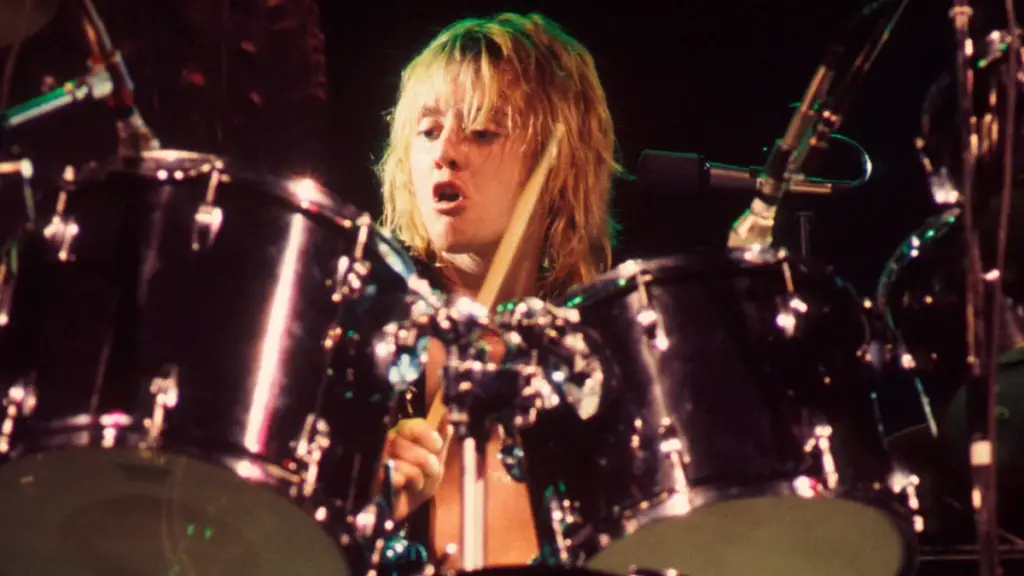
“Roger Meddows Taylor is an English musician , multi-instrumentalist, singer, and songwriter born on July 26th, 1949 in Kings Lynn, Norfolk. He was the drummer of the band Queen and wrote few of many hits such as “Under Pressure”, “A Kind Of Magic” and “Radio Ga Ga”. Despite being well known in Queen he had a solo career that up to this date has 5 studio albums and a side-band/supergroup of his called “The Cross” that went from 1987 to 1993 and him being the lead vocalist, they’ve released 3 studio albums.”
19. Rob Bourdon

“Rob started to play the drums at age ten after seeing an Aerosmith concert. His mother was friends with Joey Kramer, Aerosmith’s drummer, so Bourdon was able to go backstage and see the entire production. Kramer also gave him a kick pedal. In his early teen years, Bourdon played in bands with his friends.”
18. Clive Bunker

“Jethro Tull never had a bad drummer, but its founding member Clive Bunker stands out for his sense of swing and imaginative use of incidental percussion when the band was still out to play mainly jazz and blues. Listen to the Aqualung track “Up to Me,” and be impressed by the array of sounds he adds to an acoustic number.”
17. Jon Hiseman
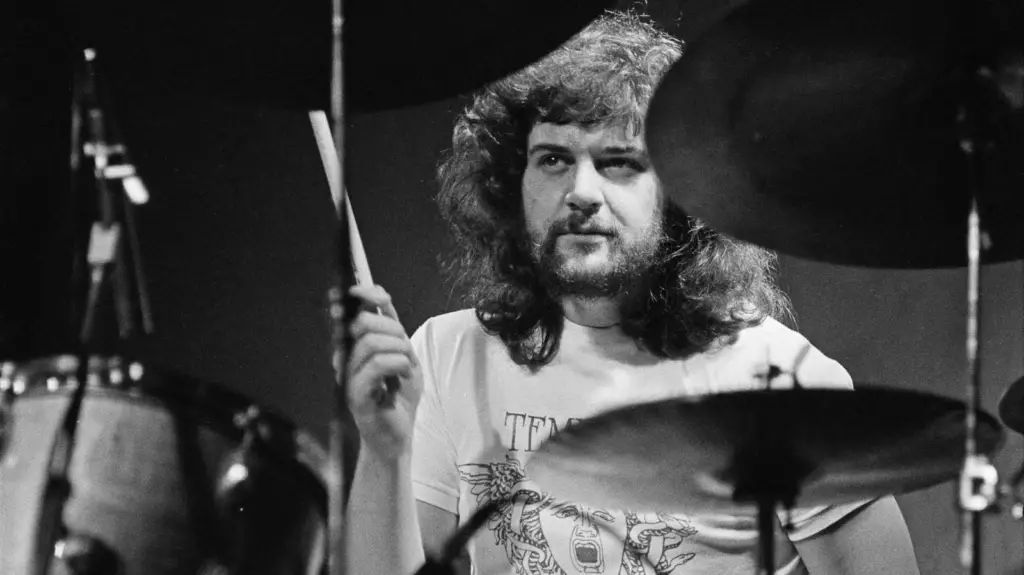
“Like many of his contemporaries (Ginger Baker, Bill Bruford), Jon Hiseman was a jazzman who crossed into the rock world. In another time, he would have been at home driving a big band. His work with Colosseum, one of the UK’s first and greatest fusion bands, is the most celebrated, but prog enthusiasts need to check out the two albums by Tempest, with a young Allan Holdsworth on guitar.”
16. Chester Thompson

“When Genesis snatched Chester Thompson out of Weather Report, they didn’t get a drummer who steered them toward jazz, rather they got one who could play Phil Collins’ existing drum parts that much more forcefully. “
15. Kevin Ellman

“The other prog drummers who played with Todd Rundgren and Utopia were no slouches, but Kevin Ellman was something else. Neil Peart claimed him as an influence, and if you listen to the busy yet in-the-pocket drumming on Utopia’s debut, you can hear why.”
14. Dave Mattacks

“Dave Mattacks is not a strictly prog drummer (or else he’d be listed much higher) but he’s a great and versatile player who’s done prog along with many other styles. Though best-known for his long service in Fairport Convention, Mattacks has been the ultimate songwriter’s drummer, able to work with the world’s best and figure out exactly what every song calls for.”
13. Andy Edwards

“Unlike many modern-day prog drummers, Andy Edwards is as much of a classic rock drummer as he is a fusion guy. During his late 90s stint with Robert Plant, he could shift from heavy-duty John Bonham parts to more fluid instrumental workouts. His ability to work both sides of the fence has distinguished Edwards’ work ever since. “
12. Chris Cutler

“Like everybody who played in Henry Cow, Chris Cutler was out to expand his instrument’s vocabulary; which meant exploring the melodic, trancelike, and noisy possibilities of percussion. He seldom played a straight backbeat, though he certainly could”
11. Terry Bozzio

“Frank Zappa’s drummers all have an arguable place here, considering the amazing dexterity it took to play Frank’s music. Terry Bozzio has the clearest prog connection, taking over in UK from the seemingly irreplaceable Bill Bruford. (He reportedly turned down an offer to join Jethro Tull afterward, preferring to get Missing Persons off the ground).”
10. B.J.Wilson

“When it came to pure imagination, B.J.Wilson was the man. You simply never knew what he was going to do next. His drum entrance on “A Salty Dog” was simply majestic and if you’ve seen video of Procol Harum in its prime, there’s one good example of Wilson‘s dexterity.”
9. Gavin Harrison, Pat Mastelotto, Jeremy Stacey

“No prog band has ever had a line-up like modern-day King Crimson, in which this triumvirate sits upfront and plays the role of a single drummer with very busy hands. It’s not just the drum energy that makes this line-up a wonder to see, it’s the perfect synchrony in their percussive tradeoffs. They’re so much of one mind that we included them here together.”
8. Jaki Liebezeit
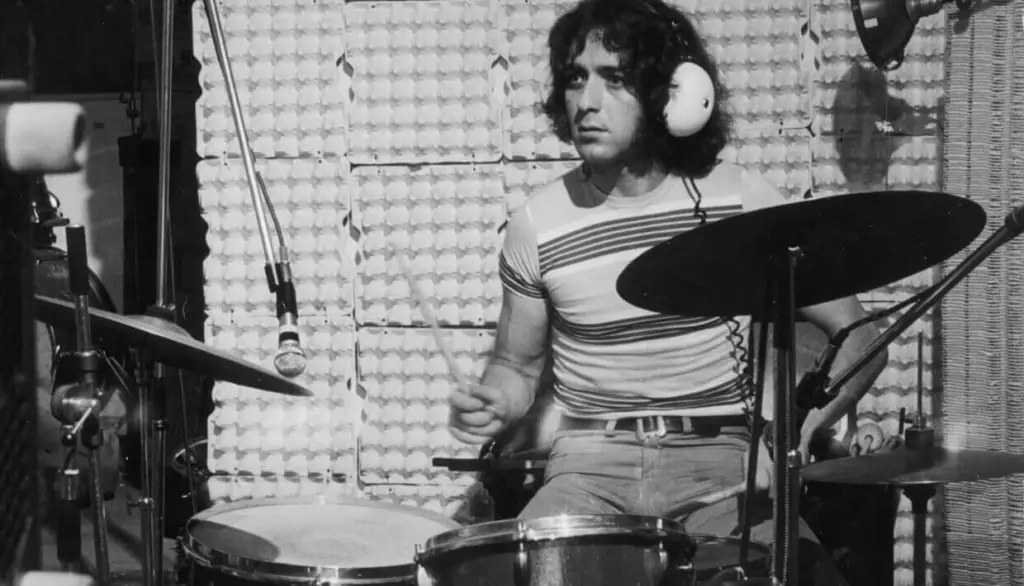
“You won’t get any flashy polyrhythms from Can’s drummer, yet Jaki Liebezeit’s invention of the grinding, machine-like approach to rhythm makes him one of the most influential prog drummers on this list; and a favorite of post-punk innovators like Brian Eno and Jah Wobble in the early 80s. The eye-opening nature of Can’s early albums derived in part from trying to play funk and getting it gloriously wrong.”
7. Alan White
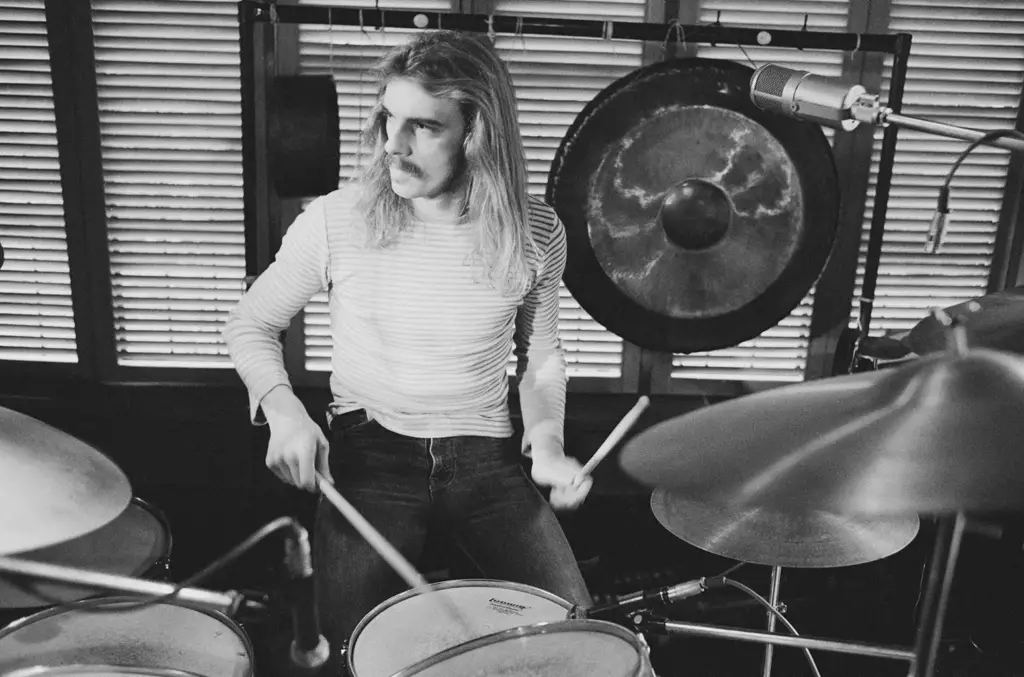
“Yes fans tend to think of Bill Bruford as the finesse drummer and Alan White as the muscular one, but that’s a bit of a reduction since they both had imagination to spare. White proved a perfect fit for the headier direction that Yes were going when he joined, and he was audibly having the time of his life with the big arena direction of 90125.”
6. Marco Minnemann

“Modern-day prog has upped the limits on pure virtuosity, and no drummer embodies that better than Marco Minnemann, a technical wizard whose live solos can top a half-hour. Give him a double-kick drum and a hi-hat and he can already play circles around most drummers.”
5. Phil Collins
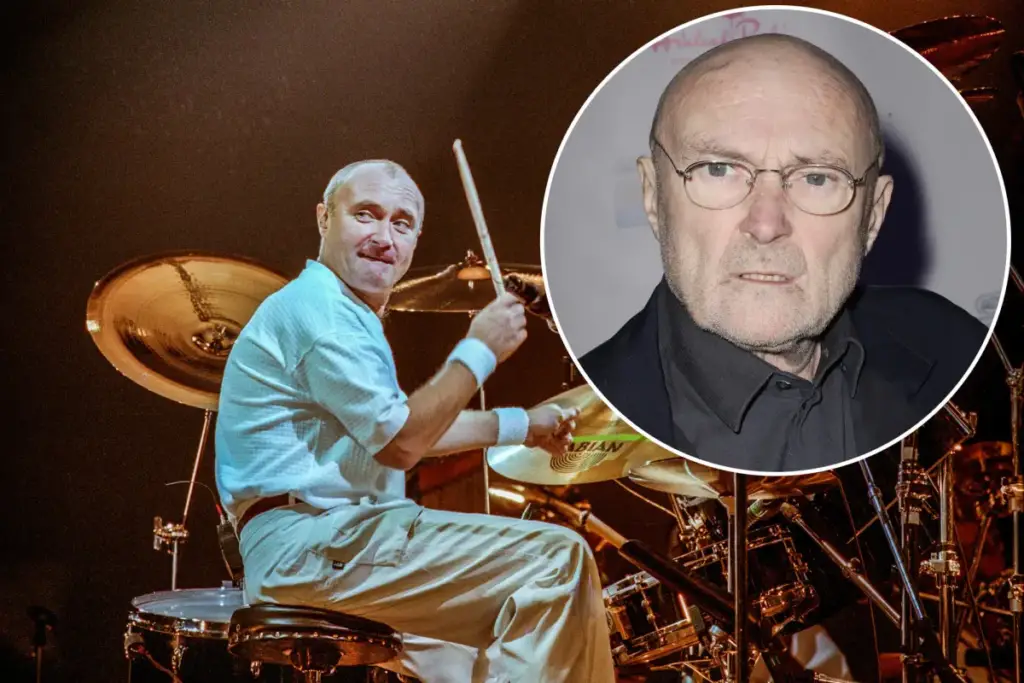
“Forget his other career for a minute, and appreciate Phil Collins for the dazzling drummer he is. First, with the jazz-influenced drumming he brought to early Genesis and Brand X and then came the momentous sessions for Peter Gabriel’s third album where he junked his cymbals, cranked some reverb, and invented the 80s drum sound.”
4. Carl Palmer

“For superhuman speed and flash, Carl Palmer is hard to beat – whether he’s pumping hard behind Emerson Lake & Palmer, or putting the same flourishes into a pop context in Asia. Quick, try to name a classic-rock hit besides “Heat of the Moment” that features marimba.”
3. Mike Portnoy

“The ultimate prog-metal drummer, Mike Portnoy is a whizkid who puts prog complexity into his metal and metal ferocity into his prog. He’s also great at keying into the drama of a song, as evinced on the flourishes he adds to the big finale of Dream Theater’s “Finally Free.”
2. Neil Peart
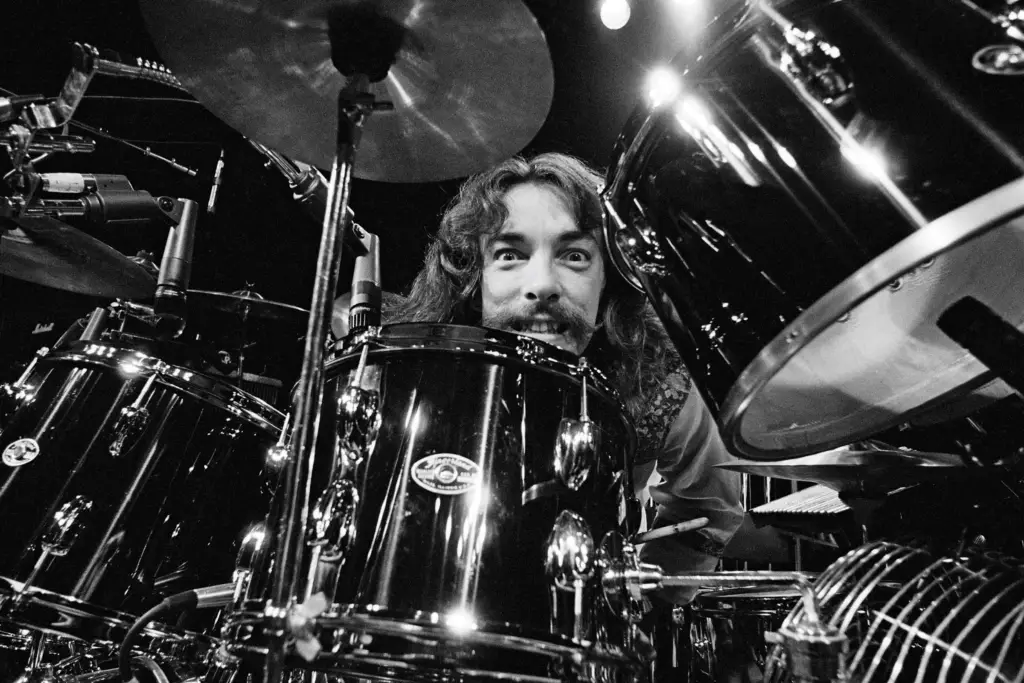
“We’re not just getting sentimental here, even though Neil Peart’s death in early 2020 still hurts. The man was a brilliantly inventive drummer who transformed the band he was in, joining Rush when they were still a workmanlike hard-rock outfit. Peart’s various solos weren’t just models of dexterity; they also had great riffs and even tunes.”
1. Bill Bruford

“Bill Bruford is simply one of the most distinctive drummers that rock ever produced. There’s always something in a Bruford performance – whether it’s a hard snare hit, a glide across the cymbals, or his impeccable sense of timing – that immediately lets you know it’s him.”

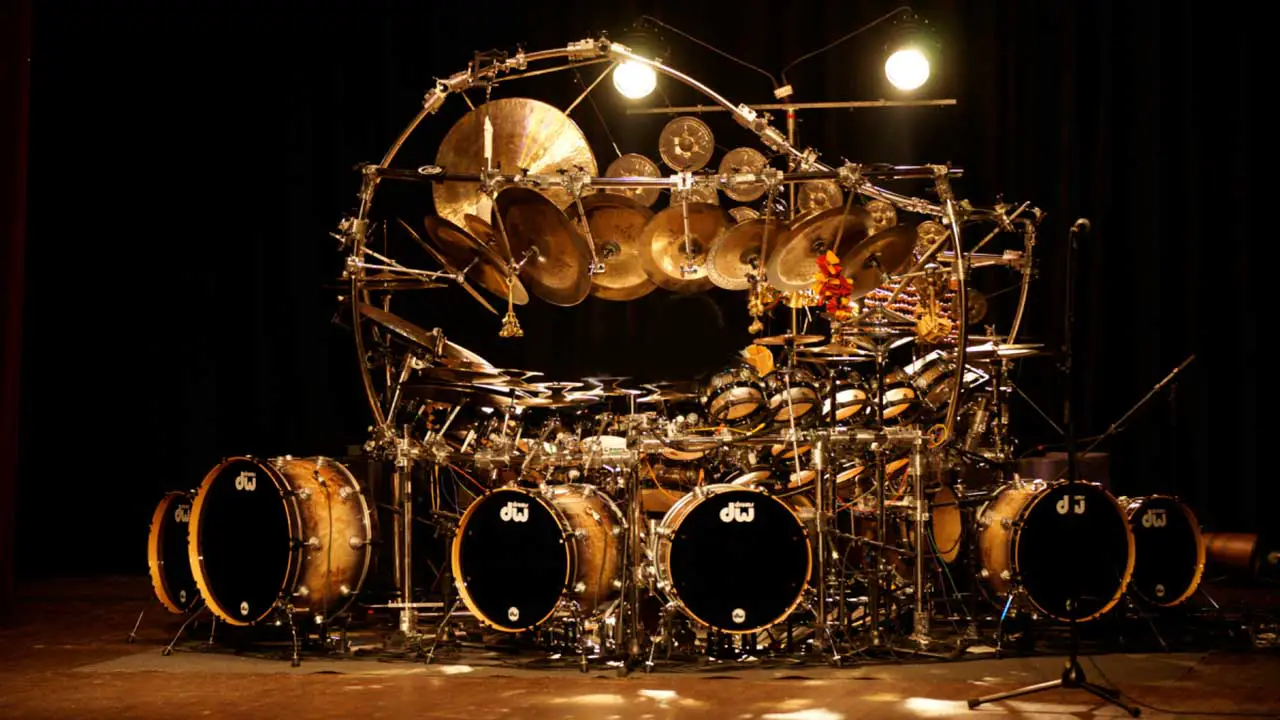
Great remarkable issues here. I?¦m very glad to look your article. Thank you so much and i am taking a look forward to touch you. Will you please drop me a e-mail?